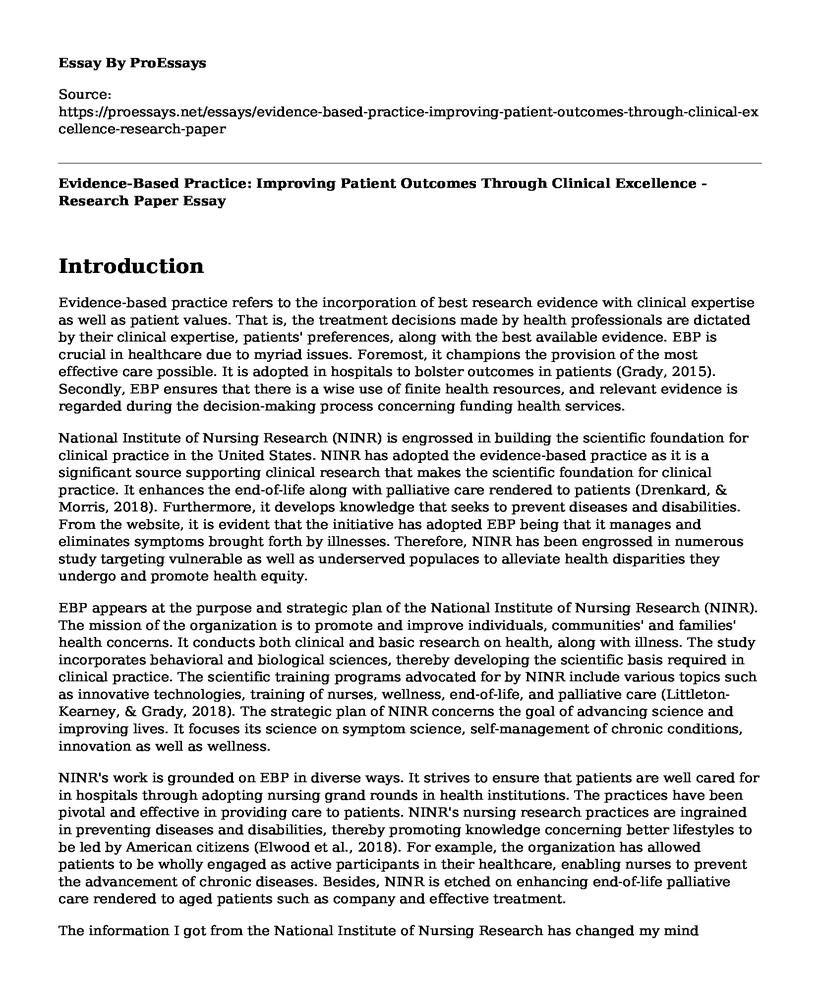Introduction
Evidence-based practice refers to the incorporation of best research evidence with clinical expertise as well as patient values. That is, the treatment decisions made by health professionals are dictated by their clinical expertise, patients' preferences, along with the best available evidence. EBP is crucial in healthcare due to myriad issues. Foremost, it champions the provision of the most effective care possible. It is adopted in hospitals to bolster outcomes in patients (Grady, 2015). Secondly, EBP ensures that there is a wise use of finite health resources, and relevant evidence is regarded during the decision-making process concerning funding health services.
National Institute of Nursing Research (NINR) is engrossed in building the scientific foundation for clinical practice in the United States. NINR has adopted the evidence-based practice as it is a significant source supporting clinical research that makes the scientific foundation for clinical practice. It enhances the end-of-life along with palliative care rendered to patients (Drenkard, & Morris, 2018). Furthermore, it develops knowledge that seeks to prevent diseases and disabilities. From the website, it is evident that the initiative has adopted EBP being that it manages and eliminates symptoms brought forth by illnesses. Therefore, NINR has been engrossed in numerous study targeting vulnerable as well as underserved populaces to alleviate health disparities they undergo and promote health equity.
EBP appears at the purpose and strategic plan of the National Institute of Nursing Research (NINR). The mission of the organization is to promote and improve individuals, communities' and families' health concerns. It conducts both clinical and basic research on health, along with illness. The study incorporates behavioral and biological sciences, thereby developing the scientific basis required in clinical practice. The scientific training programs advocated for by NINR include various topics such as innovative technologies, training of nurses, wellness, end-of-life, and palliative care (Littleton-Kearney, & Grady, 2018). The strategic plan of NINR concerns the goal of advancing science and improving lives. It focuses its science on symptom science, self-management of chronic conditions, innovation as well as wellness.
NINR's work is grounded on EBP in diverse ways. It strives to ensure that patients are well cared for in hospitals through adopting nursing grand rounds in health institutions. The practices have been pivotal and effective in providing care to patients. NINR's nursing research practices are ingrained in preventing diseases and disabilities, thereby promoting knowledge concerning better lifestyles to be led by American citizens (Elwood et al., 2018). For example, the organization has allowed patients to be wholly engaged as active participants in their healthcare, enabling nurses to prevent the advancement of chronic diseases. Besides, NINR is etched on enhancing end-of-life palliative care rendered to aged patients such as company and effective treatment.
The information I got from the National Institute of Nursing Research has changed my mind concerning the services it renders in nursing study. I used to think that the organization is only based on scientific research regarding innovative technologies to be used in healthcare. However, from going through the website, I have come to understand that the organization ventures in providing solutions to other issues that affect people's health. An example is symptom management of chronic health conditions. Moreover, it identifies underserved people in the country and health disparities that they have been subjected to. The institution has taken the necessary steps in addressing critical health issues affecting women like pregnancy as well as perinatal health. It has educated certified nurse-midwives and physicians who offer proper care to women during pregnancy to the time they deliver.
References
Drenkard, K., & Morris, T. (2018). Advocating for Nursing Research. Nursing administration quarterly, 42(2), 143-149.Retrieved from https://www.ingentaconnect.com/content/wk/naq/2018/00000042/00000002/art00010
Elwood, W. N., Huss, K., Morales, D. A., Norton, J. M., Riddle, M. W., Roof, R. A., ... & Kirkali, Z. (2018). NIH research opportunities for the prevention and treatment for chronic conditions. Translational behavioral medicine, 8(3), 509-514.Retrieved from https://academic.oup.com/tbm/article-abstract/8/3/509/5001943
Grady, P. A. (2015). National Institute of Nursing Research commentary on the Idea Festival for nursing science education. Nursing outlook, 63(4), 432-435.Retrieved from https://www.nursingoutlook.org/article/S0029-6554(15)00118-9/abstract
Littleton-Kearney, M. T., & Grady, P. A. (2018). The science of caregiving bringing voices together: Summary of National Institute of Nursing Research's 2017 summit. Nursing outlook, 66(2), 157-159.Retrieved from https://www.nursingoutlook.org/article/S0029-6554(18)30032-0/abstracthttps://www.nih.gov/about-nih/what-we-do/nih-almanac/national-institute-nursing-research-ninr
Cite this page
Evidence-Based Practice: Improving Patient Outcomes Through Clinical Excellence - Research Paper. (2023, Apr 09). Retrieved from https://proessays.net/essays/evidence-based-practice-improving-patient-outcomes-through-clinical-excellence-research-paper
If you are the original author of this essay and no longer wish to have it published on the ProEssays website, please click below to request its removal:
- Diabetes Case Study Paper
- Alzheimer Disease and the Problem Encountered by the Families of Patients Paper Example
- Essay on Accurate Diagnosis: Process and Critical Factors
- Essay Sample on Postpartum Hemorrhage: 4Ts for Prevention & Management
- Essay Sample on Child Anemia: Causes, Symptoms & Treatment
- Essay Example on Dental Radiography: Ensuring Safety and Understanding Risks
- Covid-19 Crisis: Christians Call to Unite in Trust of Holy Spirit - Essay Sample







